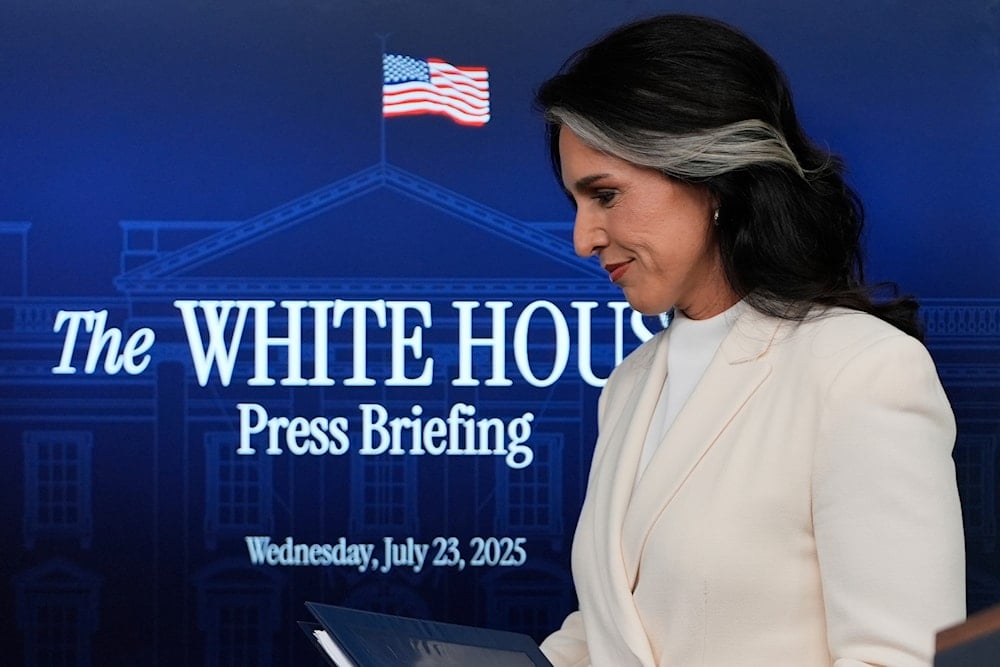US halts intel sharing on Russia-Ukraine peace talks with allies
Tulsi Gabbard’s directive to restrict Five Eyes intelligence on peace talks highlights Washington’s resistance to diplomacy, undermining chances to end the Ukraine war.
-

Director of National Intelligence Tulsi Gabbard departs after speaking with reporters in the James Brady Press Briefing Room at the White House, Wednesday, July 23, 2025, in Washington. (AP)
The Director of National Intelligence, Tulsi Gabbard, recently issued a directive instructing the US intelligence community to withhold all information regarding Russia-Ukraine peace talks from allied intelligence partners, CBS News reported.
According to a memo dated July 20 and signed by Gabbard, agencies were ordered not to share sensitive material with the “Five Eyes” alliance, a longstanding intelligence-sharing partnership between the US, UK, Canada, Australia, and New Zealand. Multiple US intelligence officials, speaking anonymously due to the sensitive nature of the matter, confirmed the order.
The directive classified all related assessments as “NOFORN,” meaning no foreign dissemination was allowed. Only information already made public could be shared, and distribution of classified materials was restricted to the originating agencies. The order did not appear to affect diplomatic channels outside of intelligence operations or military coordination unrelated to the peace talks, such as battlefield support to Ukrainian forces.
When contacted by CBS News, the Office of the Director of National Intelligence redirected inquiries to the White House, which offered no response.
Five eyes partnership
Steven Cash, a former CIA and Department of Homeland Security officer, explained the broader implications of the decision. “In general, the value of the Fives Eyes intelligence partnership is that when we are making and they are making policy decisions, we can both augment each other's intelligence and therefore know more about the plans, intentions, and capabilities of our adversaries,” he said. He added that the alliance has traditionally operated on the assumption that all members are “sitting on the same side of the table with some other adversary on the other side.”
The Five Eyes partnership dates back to a secret post-World War II pact between the US and UK, later joined by Canada, Australia, and New Zealand. Over the decades, the network became a central pillar of Western intelligence-sharing. However, some former officials now warn that Gabbard’s directive could strain this relationship, discouraging cooperation and eroding trust built over decades.
National security contributor Sam Vinograd emphasized the potential consequences: “Shutting our most trusted partners off from intelligence assessments could have a chilling effect on critical intelligence sharing if our partners believe they're being shut out of key access, including on key matters in their region.” She cautioned that allied nations might develop alternative intelligence channels without US involvement, undermining future collaboration.
Others, however, argue that such measures are not unusual. Ezra Cohen, a former acting undersecretary of defense for intelligence, noted that information is often withheld between Five Eyes members. “There is a lot of information we do not share even with our Five Eyes partners, and it works in the reverse,” Cohen explained. He suggested criticism of Gabbard’s directive reflects broader political opposition rather than a true breach of norms.
Meanwhile, the war in Ukraine shows no sign of abating.
Read more: Trump's DNI designate Tulsi Gabbard rejects pardon for Edward Snowden

 3 Min Read
3 Min Read











